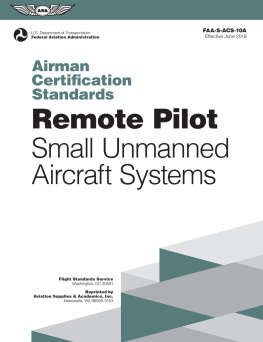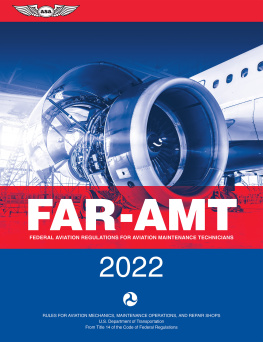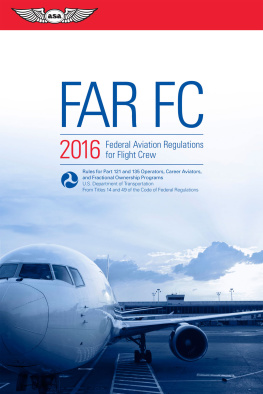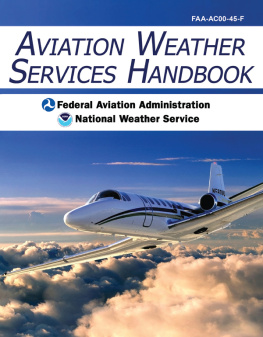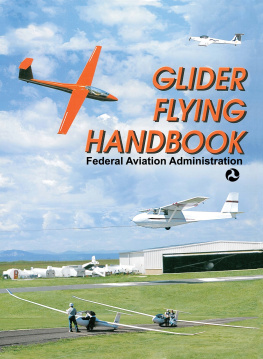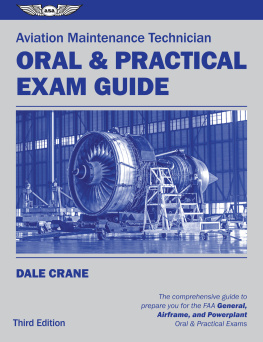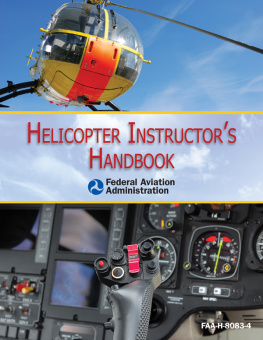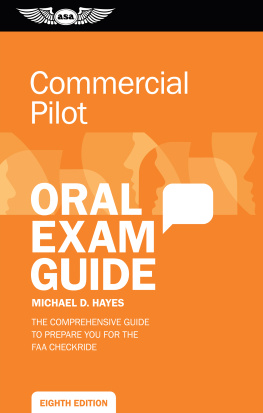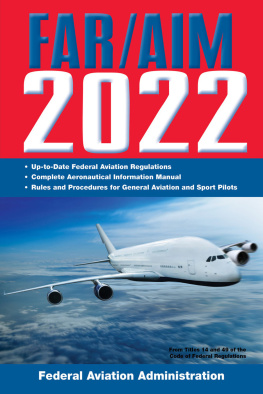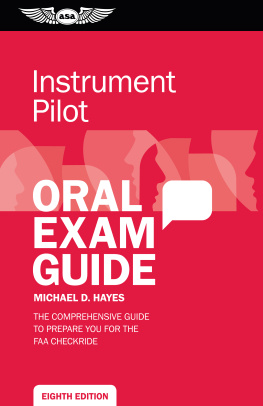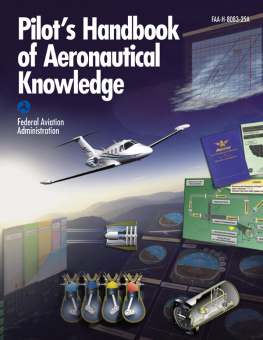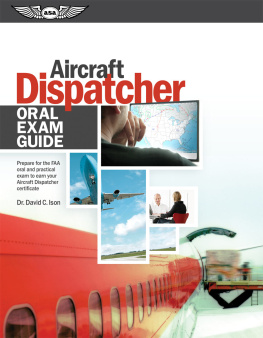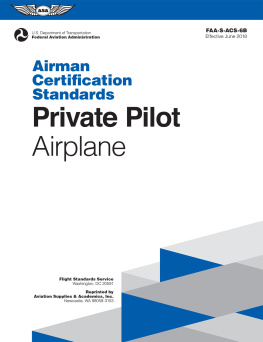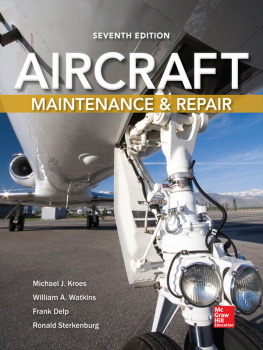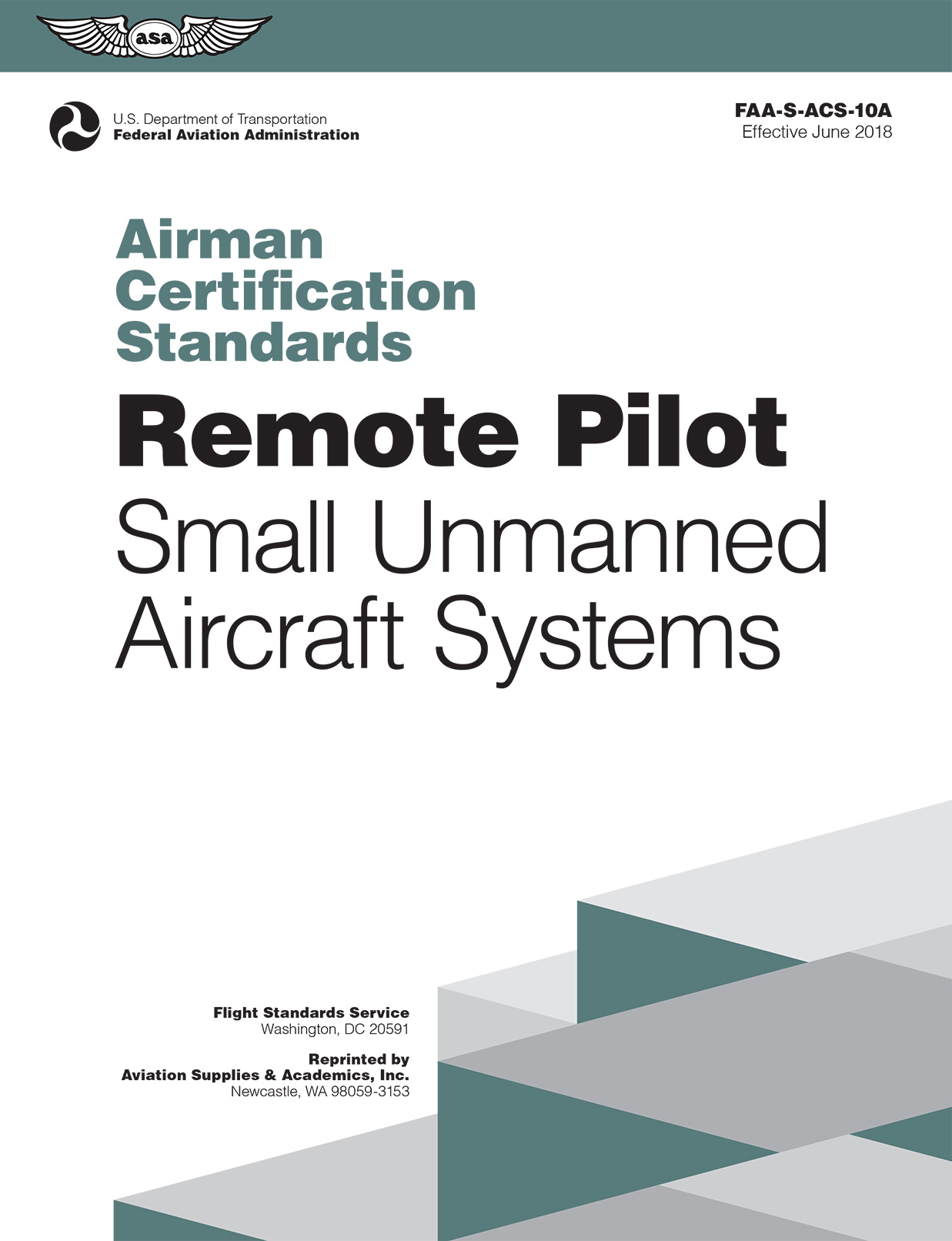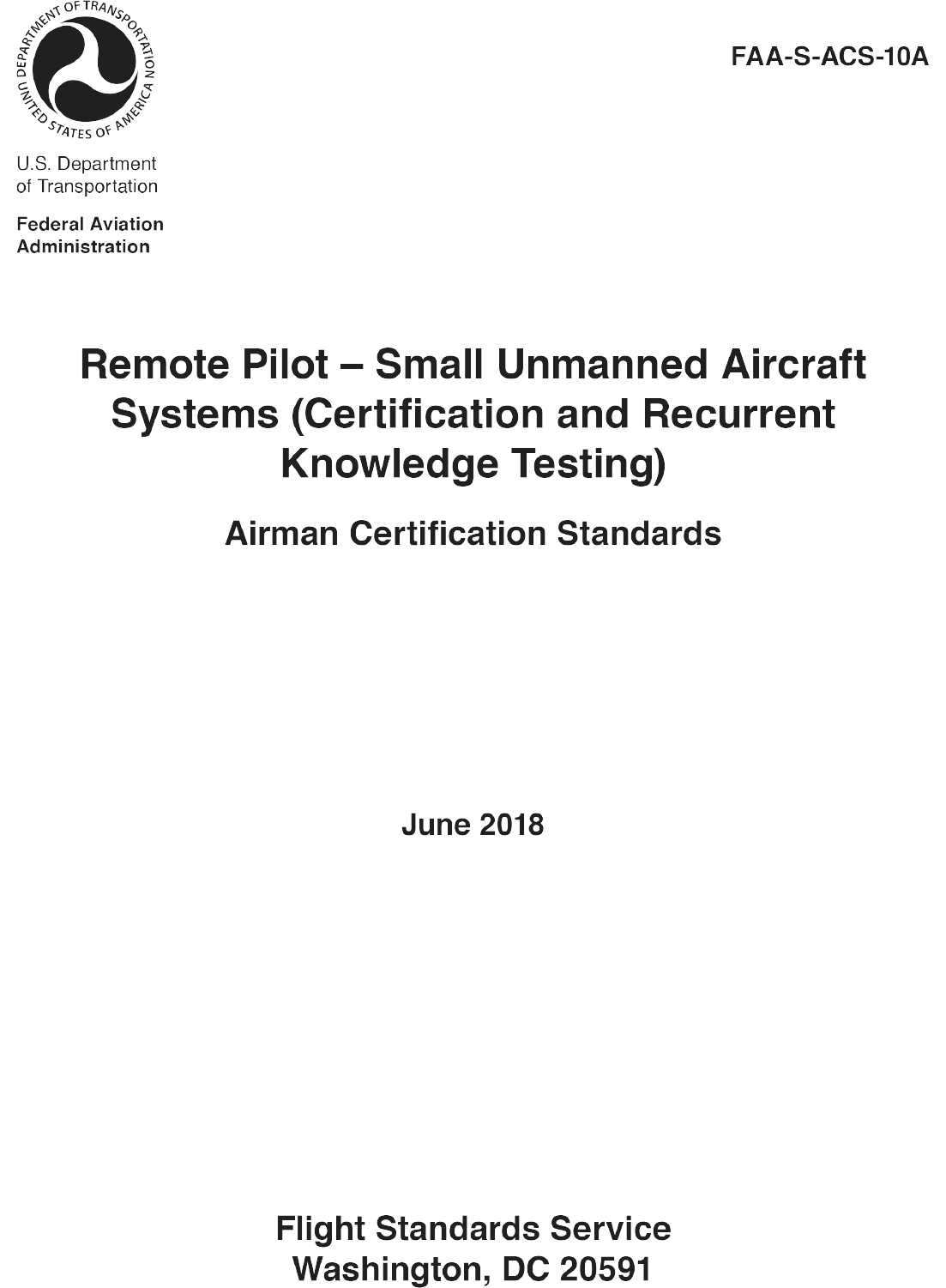
Acknowledgments
The U.S. Department of Transportation, Federal Aviation Administration (FAA), Office of Safety Standards, Regulatory Support Division, Airman Testing Branch, P.O. Box 25082, Oklahoma City, OK 73125 developed this Airman Certification Standards (ACS) document with the assistance of the subject matter experts in the area related to small Unmanned Aircraft Systems (sUAS).
Availability
This ACS is available for download from . Material in FAA-S-ACS-10A will be effective June 11, 2018.
Foreword
The Federal Aviation Administration (FAA) has published the Remote Pilot small Unmanned Aircraft Systems (sUAS) Airman Certification Standard (ACS) document to communicate the aeronautical knowledge standards for certification and recurrent knowledge testing for a Remote Pilot Certificate with an sUAS rating.
The FAA views the ACS as the foundation to an integrated and systematic approach to airman certification. The ACS is part of the safety management system (SMS) framework that the FAA uses to mitigate risks associated with airman certification training and testing. Specifically, the ACS, associated guidance, and test question components of the airman certification system are constructed around the four functional components of an SMS:
Safety Policy that defines and describes aeronautical knowledge and risk management as integrated components of the airman certification system;
Safety Risk Management processes through which internal stakeholders identify and evaluate regulatory changes, safety recommendations, or other factors that require modification of airman testing and training materials;
Safety Assurance processes to ensure the prompt and appropriate incorporation of changes arising from new regulations and safety recommendations; and
Safety Promotion in the form of ongoing engagement with both external stakeholders and FAA policy divisions.
The FAA has developed the ACS with the goal to drive a systematic approach to all components of the airman certification system which includes the knowledge test question development, course development, and guidance material. The FAA acknowledges and appreciates the many hours that aviation experts, both internal and external to the FAA, have contributed toward this goal. This level of collaboration, a hallmark of a robust safety culture, strengthens and enhances aviation safety at every level of the airman certification system.

John S. Duncan Executive Director, Flight Standards Service
Revision History
Document# | Description | Revision Date |
FAA-S-ACS-10 | Remote Pilot Small Unmanned Aircraft Systems Airman Certification Standards | July 2016 |
FAA-S-ACS-10A | Remote Pilot Small Unmanned Aircraft Systems (Certification and Recurrent Knowledge Testing) Airman Certification Standards | June 2018 |
Major Enhancements to Version FAA-S-ACS-10A
Revised Introduction and appendices to include information on recurrent testing and to account for FAA reorganization.
Added asterisk (*) to Task title applicable to recurrent testing.
Updated Task References, as necessary.
Updated the following Appendices:
Appendix 1: Certification and Recurrent Knowledge Tests, Eligibility, and Testing Centers
Appendix 3: Airman Knowledge Test Report for Certification and Recurrent Testing
Introduction
Airman Certification Standards Concept
The goal of the airman certification process is to ensure the applicant possesses knowledge consistent with the privileges of the Remote Pilot Certificate with a small Unmanned Aircraft Systems (sUAS) rating, as well as the ability to manage the risks of flight in order to act as a remote pilot-in-command (PIC).
In fulfilling its responsibilities for the airman certification process, the Federal Aviation Administration (FAA) Flight Standards Service (AFS) plans, develops, and maintains materials related to airman certification testing. These materials include several components. The FAA knowledge test measures mastery of the aeronautical knowledge areas listed in Title 14 of the Code of Federal Regulations (14 CFR) part 107. Other materials, such as airman knowledge testing supplements in the FAA-CT-8080 series and an FAA online training course, provide guidance to applicants on aeronautical knowledge and risk management.
The FAA recognizes that safe operations in todays complex National Airspace System (NAS) require a more systematic integration of aeronautical knowledge and risk management. The FAA further recognizes the need to more clearly calibrate knowledge and risk management to the level of the Remote Pilot Certificate with an sUAS rating.
The ACS integrates the elements of knowledge and risk management in 14 CFR part 107 for a Remote Pilot Certificate with an sUAS rating. It thus forms the comprehensive standard for what an applicant must know and consider to successfully completing each Task tested on the knowledge test.
In keeping with this integrated and systematic approach, the knowledge Task elements of each Task identify what the applicant must know and understand for sUAS operations conducted under part 107. The applicant demonstrates this understanding by passing the knowledge test.
Using the ACS
This Remote Pilot ACS includes Areas of Operation and Tasks for the issuance of a Remote Pilot Certificate with an sUAS rating and the recurrent knowledge testing requirements in accordance with 14 CFR part 107, section 107.65. Tasks that apply to recurrent testing are marked with an asterisk (*), all Tasks apply to certification testing.
Each Task in the ACS is coded according to a scheme that includes four elements. For example:
UA.I.B.K10:
UA = Applicable ACS (Unmanned Aircraft Systems)
I = Area of Operation (Regulations)
B = Task (Operating Rules)
K10 = Task element Knowledge 10 (Visual line of sight (VLOS) aircraft operations)
Knowledge test questions are linked to the ACS codes, which will ultimately replace the system of Learning Statement Codes (LSC). After this transition occurs, the Airman Knowledge Test Report (AKTR) will list an ACS code that correlates to a specific Task element for a given Area of Operation and Task. Each LSC provides the applicant with information that will assist in future test taking.
The current knowledge test management system does not have the capability to print ACS codes. Until a new test management system is in place, the LSC, such as Pilot Learning Statement (PLT) codes will continue to be displayed on the AKTR. The PLT codes are linked to references leading to broad subject areas. By contrast, each ACS code is tied to a unique Task element in the ACS itself. Because of this fundamental difference, there is no one-to-one correlation between PLT codes and ACS codes. For a list of the Pilot Learning Statement codes, please see the Learning Statement Reference Guide at the following link: www.faa.gov/training_testing/testing/media/LearningStatementReferenceGuide.pdf.
For those applicants who do not pass the knowledge test for certification or recurrent testing, remedial instruction and an endorsement from an instructor is not required for retesting. See Appendix 1: Certification and Recurrent Knowledge Tests, Eligibility, and Testing Centers for details on passing the Unmanned Aircraft General Small (UAG) certification airman knowledge test and the Unmanned Aircraft General Small Recurrent (UGR) airman knowledge test.

